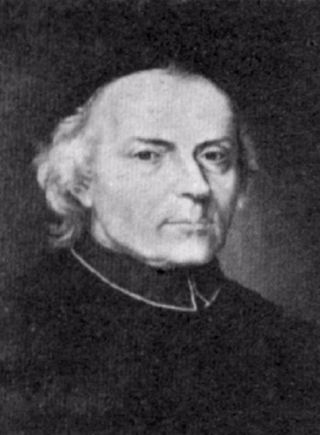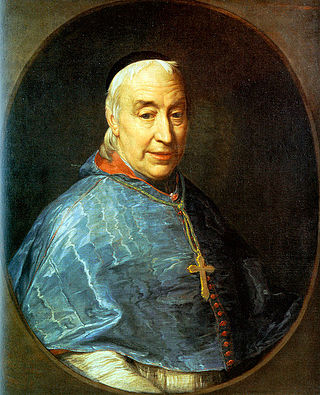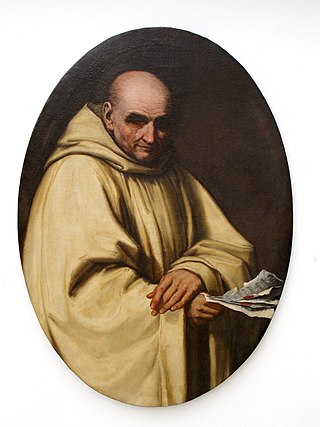
The Aldine Press was the printing office started by Aldus Manutius in 1494 in Venice, from which were issued the celebrated Aldine editions of the classics. The first book that was dated and printed under his name appeared in 1495.

Giovanni Battista Guarini was an Italian poet, dramatist, and diplomat.

Lodovico Antonio Muratori was an Italian Catholic priest, notable as historian and a leading scholar of his age, and for his discovery of the Muratorian fragment, the earliest known list of New Testament books.

Leo Allatius was a Greek scholar, theologian, and keeper of the Vatican library.
Heinrich Joseph Dominicus Denzinger was a leading German Catholic theologian and author of the Enchiridion symbolorum et definitionum, a work commonly referred to simply as Denzinger after him.

Gian (Giovanni) Domenico Mansi was an Italian prelate, theologian, scholar and historian, known for his massive works on the Church councils.
Orientius was a Christian Latin poet of the fifth century.

Andrea Antico was a music printer, editor, publisher and composer of the Renaissance born in the Republic of Venice, of Istrian birth, active in Rome and in Venice. He was the first printer of sacred music in Rome, and the earliest competitor of Venetian Ottaviano Petrucci, who is regarded as the first significant music printer.
Luigi Lippomano was an Italian bishop and hagiographer.

The erudite Augustinian Onofrio Panvinio or Onuphrius Panvinius was an Italian historian and antiquary, who was librarian to Cardinal Alessandro Farnese.
Titus of Bostra was a Christian theologian and bishop. Sozomen names Titus among the great men of the time of Constantius.

Marcus Eremita, Mark the Ascetic or Marcus the Ascetic was a Christian theologian, saint, and ascetic writer of the fifth century AD.

The migration waves of Byzantine Greek scholars and émigrés in the period following the end of the Byzantine Empire in 1453 is considered by many scholars key to the revival of Greek studies that led to the development of the Renaissance humanism and science. These émigrés brought to Western Europe the relatively well-preserved remnants and accumulated knowledge of their own (Greek) civilization, which had mostly not survived the Early Middle Ages in the West. The Encyclopædia Britannica claims: "Many modern scholars also agree that the exodus of Greeks to Italy as a result of this event marked the end of the Middle Ages and the beginning of the Renaissance", although few scholars date the start of the Italian Renaissance this late.
Arsenius Apostolius was a Greek scholar who lived for a long time in Venice. He was also bishop of Monemvasia in the Peloponnese.
Marcus Diadochus was a Christian writer of the fourth century.

The House of Vendramin was a rich merchant family of Venice, Italy, who were among the case nuove or "new houses" who joined the patrician class when the Libro d'Oro was opened after the battle of Chioggia. Andrea Vendramin served as the sole Vendramin Doge from 1476–78, at the height of Venetian power, though in 1477 an Antonio Feleto was imprisoned, then banished, for remarking in public that the Council of the Forty-One must have been hard-pressed to elect a cheesemonger Doge. In his youth, Andrea and his brother Luca, in joint ventures, used to ship from Alexandria enough goods to fill a galley or a galley and a half, Malipiero recorded in retrospect: even his factors grew rich managing his affairs. At this period, mentions of Vendramins in various fields of business occur; Luca Vendramin (d.1527) founded a successful bank on the still-wooden Rialto Bridge with three Capelli brothers in 1507, but in his will of 1524 forbade his sons from continuing in banking. An early text on accounting mentions that the Vendramins' soap is so reliably good that you can buy it without inspecting it. Later they owned an important theatre.

Pietro Delfino or Delfin, O.S.B. Cam., was an Italian Camaldolese monk, patristic scholar, theologian, abbot, and Superior General of his religious Order.
Ecclesiastical history of the Catholic Church refers to the history of the Catholic Church as an institution, written from a particular perspective. There is a traditional approach to such historiography. The generally identified starting point is Eusebius of Caesarea, and his work Church History.
Antonius Agellius, C.R. or Antonio Agellio (1532–1608) was bishop of Acerno and a member of the Theatines, born in Sorrento. He was an editor of the Clementine edition of the Latin Vulgate.

Famiano Strada was an Italian Jesuit and historian of wars in the low countries during the early part of the Eighty Years' War, starting with the abdication of Charles V in 1556 to the capture of Rheinsberg in 30 January 1590.











